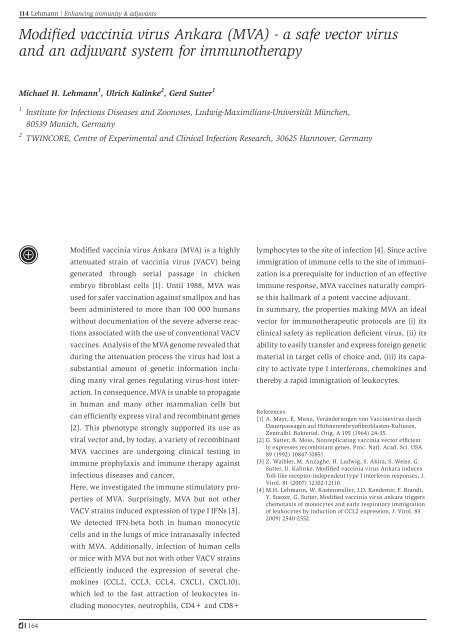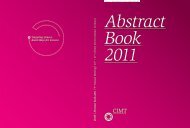Abstract Book 2010 - CIMT Annual Meeting
Abstract Book 2010 - CIMT Annual Meeting
Abstract Book 2010 - CIMT Annual Meeting
You also want an ePaper? Increase the reach of your titles
YUMPU automatically turns print PDFs into web optimized ePapers that Google loves.
114 Lehmann | Enhancing immunity & adjuvants<br />
Modified vaccinia virus Ankara (MVA) - a safe vector virus<br />
and an adjuvant system for immunotherapy<br />
Michael H. Lehmann 1 , Ulrich Kalinke 2 , Gerd Sutter 1<br />
1 Institute for Infectious Diseases and Zoonoses, Ludwig-Maximilians-Universität München,<br />
80539 Munich, Germany<br />
2 TWINCORE, Centre of Experimental and Clinical Infection Research, 30625 Hannover, Germany<br />
164<br />
Modified vaccinia virus Ankara (MVA) is a highly<br />
attenuated strain of vaccinia virus (VACV) being<br />
generated through serial passage in chicken<br />
embryo fibroblast cells [1]. Until 1988, MVA was<br />
used for safer vaccination against smallpox and has<br />
been administered to more than 100 000 humans<br />
without documentation of the severe adverse reactions<br />
associated with the use of conventional VACV<br />
vaccines. Analysis of the MVA genome revealed that<br />
during the attenuation process the virus had lost a<br />
substantial amount of genetic information including<br />
many viral genes regulating virus-host interaction.<br />
In consequence, MVA is unable to propagate<br />
in human and many other mammalian cells but<br />
can efficiently express viral and recombinant genes<br />
[2]. This phenotype strongly supported its use as<br />
viral vector and, by today, a variety of recombinant<br />
MVA vaccines are undergoing clinical testing in<br />
immune prophylaxis and immune therapy against<br />
infectious diseases and cancer.<br />
Here, we investigated the immune stimulatory properties<br />
of MVA. Surprisingly, MVA but not other<br />
VACV strains induced expression of type I IFNs [3].<br />
We detected IFN-beta both in human monocytic<br />
cells and in the lungs of mice intranasally infected<br />
with MVA. Additionally, infection of human cells<br />
or mice with MVA but not with other VACV strains<br />
efficiently induced the expression of several chemokines<br />
(CCL2, CCL3, CCL4, CXCL1, CXCL10),<br />
which led to the fast attraction of leukocytes including<br />
monocytes, neutrophils, CD4+ and CD8+<br />
lymphocytes to the site of infection [4]. Since active<br />
immigration of immune cells to the site of immunization<br />
is a prerequisite for induction of an effective<br />
immune response, MVA vaccines naturally comprise<br />
this hallmark of a potent vaccine adjuvant.<br />
In summary, the properties making MVA an ideal<br />
vector for immunotherapeutic protocols are (i) its<br />
clinical safety as replication deficient virus, (ii) its<br />
ability to easily transfer and express foreign genetic<br />
material in target cells of choice and, (iii) its capacity<br />
to activate type I interferons, chemokines and<br />
thereby a rapid immigration of leukocytes.<br />
References<br />
[1] A. Mayr, E. Munz, Veränderungen von Vaccinevirus durch<br />
Dauerpassagen auf Hühnerembryofibroblasten-Kulturen,<br />
Zentralbl. Bakteriol. Orig. A 195 (1964) 24-35.<br />
[2] G. Sutter, B. Moss, Nonreplicating vaccinia vector efficient<br />
ly expresses recombinant genes, Proc. Natl. Acad. Sci. USA<br />
89 (1992) 10847-10851.<br />
[3] Z. Waibler, M. Anzaghe, H. Ludwig, S. Akira, S. Weiss, G.<br />
Sutter, U. Kalinke, Modified vaccinia virus Ankara induces<br />
Toll-like receptor-independent type I interferon responses, J.<br />
Virol. 81 (2007) 12102-12110.<br />
[4] M.H. Lehmann, W. Kastenmuller, J.D. Kandemir, F. Brandt,<br />
Y. Suezer, G. Sutter, Modified vaccinia virus ankara triggers<br />
chemotaxis of monocytes and early respiratory immigration<br />
of leukocytes by induction of CCL2 expression, J. Virol. 83<br />
2009) 2540-2552.



